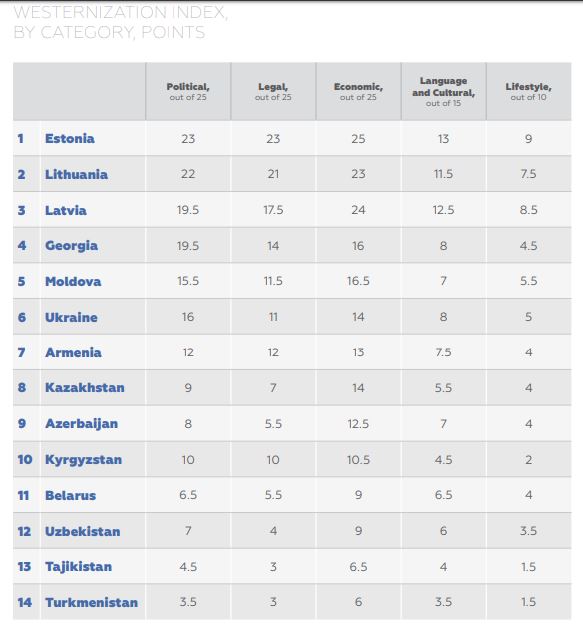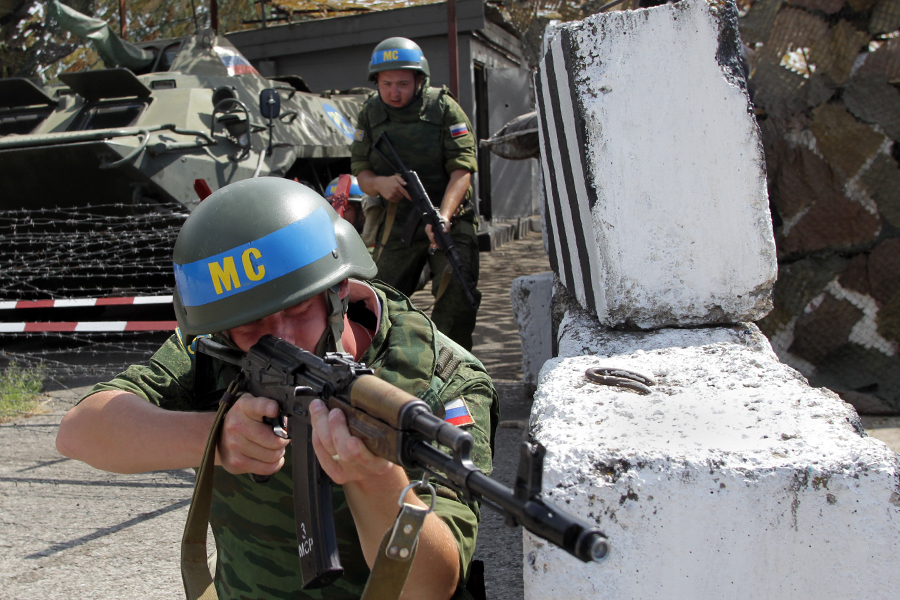Ukraine ranks 6th among 14 former Soviet republics by its level of integration into the western political, economic, and cultural space. The first annual «Westernization Index 2018» was released by the StrategEast in collaboration with the experts of the New Europe Center.
The Index measures the level to which 14 post-Soviet countries, sans the Russian Federation (post-Soviet, non-Russia), have adopted the Western model by looking at five key areas:
- Political Westernization.
- Economic Westernization.
- Legal Westernization.
- Language and cultural Westernization.
- Westernization of lifestyle
The analysis is undertaken by local experts in each country.
Anatoly Motkin, founder and president of StrategEast, explains the goal of this research product:
“We seek to help the PSNR nations better address the shared challenges they face in the process of re-building their states and institutions since the collapse of the Soviet Union. Second, we seek to draw attention to an important but geopolitically fragile region in a way that helps the international community better support its development.”
Ukraine lags behind the Baltic States (Estonia, Lithuania, and Latvia), Georgia, and Moldova. Armenia is in 7th place, Kazakhstan – 8th, Azerbaijan ranks 9th, Kyrgyzstan – 10th, Belarus – 11th, Uzbekistan – 12th, Tajikistan – 13th, and the most secluded country in the region, Turkmenistan is in 14th place.

“The index groups countries into four categories based on their scores: Genuine Pro-Westerners, Pro-Western Facades, Balancing Pragmatists, and ‘Fortress’ States. The scores show that the countries are very different in their ambition to adopt western elements of governance in the researched areas. Some countries such as Estonia, Latvia, and Lithuania have been consistent with their pro-Western policy and implemented reforms which allowed them to be considered westernized. Others, like Ukraine, Georgia, and Moldova have been very vocal on their westernization path; however, their progress is still insufficient and unsystematic. The rest of the countries prefer to balance their policy or to distance themselves for either policy,” said Leonid Litra, senior research fellow at the New Europe Center, one of the authors of the report.
“Most countries have ratified major international conventions and have passed laws protecting human rights and freedoms. In practice, however, enforcement of these laws is weak, and many countries explain this by stating that they have to take into consideration local traditions (e.g. historical experience or religious dogmas). Moreover, closeness to Europe is not always a guarantee of legal protection. For example, Kyrgyzstan scores relatively high despite being geographically farther away from Europe, while Belarus is close to Central Asian countries in its legal Westernization level,” Serhiy Solodkyy, first deputy director of the New Europe Center, one of the authors of the report told.
Daria Gaidai, research fellow at the New Europe Center, emphasized that Russian influence is still strong over the PSNR nations:
“Russia maintains a significant cultural influence in the vast majority of the PSNR, although today it has to compete not only with Western products, but also Turkish ones. Russian TV and social networks are the primary instruments of this influence. Still, individual countries’ desire to reduce the amount of Russian-language content does not necessarily lead to the corresponding increase of Western content. More often, countries try to expand broadcasting of locally-produced movies, TV series, and programs.”
Aleksander Kwasniewski, President of Poland in 1995-2005, points that this index sheds new light on the future of the post-Soviet region:
“By looking at the post-Soviet, non-Russia region through one lens, this index fills a critical gap, helping us to consider how a shared past can lead to so many variations of the present.”
The report is available here.








